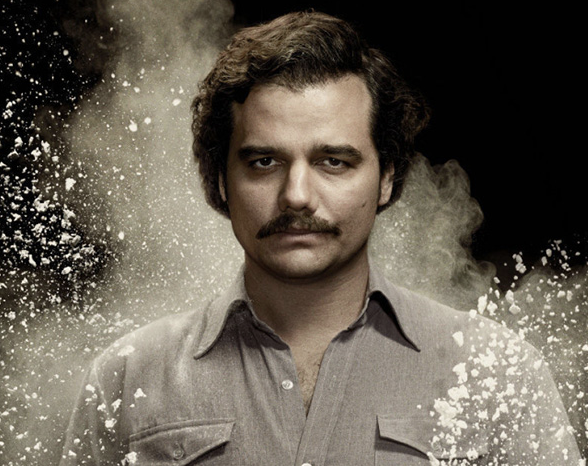Who Gets to Tell Pablo Escobar’s Story?

Medium.com
Tension rises. Inside “La Catedral”, Pablo Escobar and the vice-president cannot come to an agreement. Outside, military helicopters, cars, and tanks prepare for battle, ready to storm in with all they have. They start approaching silently, as hundreds of men from all different angles await the moment to make a move. Inside, Escobar’s pawns prepare for battle too; guns in their hands and sweat trickling down their foreheads.
Bombs burst through the gates and soldiers flood into “La Catedral”. Shouts, explosions, gunshots… One after the other. With a bullet to the head, the first man is down, and after that, many others fall with him. Bombs, gas, and bullets are everywhere. Dead bodies pile up. This huge battle unravels as soldiers start getting closer to Escobar. But, at this point, his escape is almost fully complete. With few of his men alive and only a second to spare before he gets caught, Pablo Escobar, successfully, makes his way out of his prison facility.
Today marks the 5th anniversary of the airing of Netflix’s Narcos. A TV show about drugs, death, dollars, and drama. More specifically, the Hollywood show portrays the rise and fall of the most powerful drug lord in history: Pablo Escobar. Narcos takes us through Colombia during the 80s and 90s and exposes us to the inner workings of the cartel and narco-trafficking world. The TV show is praised for being a realistic remake of the events that led Escobar to be brought to justice. However, there is an untold side to his story.
It is no surprise that the show isn’t 100% accurate. Pablo Escobar was a very secretive man. With an empire beneath him, he had the power, and connection (including with the police) to do as he pleased. Consequently, there is a great deal of conflicting information about Escobar’s life, which blurs the line separating fact and fiction. Apart from that, Hollywood strives for drama, so details may have been altered for the benefit of sales and views. Memories and stories are always told with a certain bias, so the audience is left asking: what really happened?
One of the most climactic scenes of Narcos is when Escobar once again manages to escape the DEA —but only after a very over-the-top confrontation. These melodramatic antics are a trademark of Hollywood shows and undoubtedly incorporated in Narcos. While the show has clarified it is based on facts, viewers must question to what extent? The American series Narcos tells Escobar’s story their way, with a few naming disagreements, an extra Hollywood romance, some historical inaccuracies, and invented characters. An example of an invented character is Carlos Henão, who is Escobar’s brother in law. He was portrayed as a drug dealer in the series, while in fact, reporters have stated that he was not involved in any illicit activities. The show itself is narrated by two American DEA officers who are based on real people, who’s bias can undoubtedly be seen in the telling of the story: an American TV show glorifies American DEA agents.
Perhaps a more truthful recollection of Escobar’s story comes from his own son, Sebastián Marroquín. Marroquín has publicly argued that the show offends his nation’s history and their many victims. For instance, Marroquín, inaccurately portrayed in the series as an innocent child even though he was a teenager at that time, recounts the persecution scene described at the start of this article utterly different. He argued that “there was no big show-down there, just one dead jail guard.” According to Escobar’s son, the combat was not the size Hollywood portrayed it. Sebastián is not a fan of the show, either. He claims that its inaccuracies are insulting. On his personal Facebook account, he posted a lengthy text exhibiting 28 errors the show allegedly committed. He even mentioned a book he’s been writing, exposing “the real truth about his father”. The responses to the book’s reveal have been mixed; some people are curious to see another side of the infamous Escobar, and some believe that this new perspective-framing the drug-dealer as more of a normal man is just a marketing strategy. Marroquín reportedly lived with the drug lord during many of his most crime-filled years, and saw his malignancy first-hand, yet loved him unconditionally. This fact led many to question: does Marroquín’s emotional connection to the narco make his perspective unreliable?
A final perspective is a Colombian woman, who asked to remain anonymous, with no direct link to Pablo Escobar or any shows that profit off of his dramatic life. She is a Graded mom, who lived through the narco period in Colombia as an adolescent. This Graded mom —in an exclusive interview with the Talon— said that the American production discredited, and even ridiculed many serious institutions like the Colombian Police Force, the Army, and even the Colombian politicians. She also mentioned that there are many historical inaccuracies included to purposely “spice” up the story. Was there really so much corruption in the Colombian government during the late 80s? Is her point of view influenced by her sense of national pride? Or does the TV show, in fact, glorify the United States and inferiorize Colombia?
Countless sources support the argument that Pablo Escobar was a bad man, nevertheless, nobody but him will ever be able to tell exactly what happened throughout his life. Escobar’s death in December of 1993 rules out that option, so, the next thing we have to ask is: Who gets to tell his story? Is an American TV show possibly idolizing two DEA officers? Escobar’s son, and his undebatable connection to the drug-lord? A Colombian woman who takes pride in her country? Maybe, a thoughtful audience must consider a mixture of all three perspectives…

As a first year “Talonista”, Letícia finds her way into the features section. If we were back at the Graded halls, Letícia could be seen struggling...








